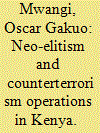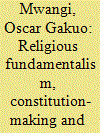| Srl | Item |
| 1 |
ID:
103053


|
|
|
| 2 |
ID:
151750


|
|
|
|
|
| Summary/Abstract |
Counterterrorism operations in Kenya have often been hindered by a lack of collaboration, coordination and cooperation among the security agencies involved in such operations. This article examines the relationship between neo-elitism and counterterrorism security interagency activity in Kenya. Using neo-elitism as a framework for analysis, with specific reference to the September 2013 Westgate Mall attack counterterrorism operation, it is argued that the lack of collaboration, coordination and cooperation among Kenya’s counterterrorism security agencies often results in unintended adverse consequences. The interagency conflict over the Westgate operation was primarily about command and control, intelligence sharing and official information shared with the public pertaining to the stages of the siege and operation. These security agencies share similar responsibilities and jurisdictions in the rest of the country’s counterterrorism efforts. The interagency conflicts reveal that the country’s security elites pursue personal and agency-specific interests that are aimed at maintaining organisational supremacy over counterterrorism efforts. Recommendations are offered for how to tackle the problem of interagency conflict in order to enhance the effectiveness of counterterrorism operations in Kenya.
|
|
|
|
|
|
|
|
|
|
|
|
|
|
|
|
| 3 |
ID:
084754


|
|
|
|
|
| Publication |
2008.
|
| Summary/Abstract |
This article examines political corruption and political party financing in multiparty Kenya. It uses the Goldenberg and Anglo-Leasing mega-scandals to demonstrate the existence of political corruption, particularly campaign financing, arguing that it has increased under multiparty rule and affected the nature of governance. It has adversely affected political participation and competition, the rule of law, transparency and accountability. Illegal funds to finance the Kenya African National Union's elections in the 1990s were raised through the Goldenberg Affair, whereas those aimed at financing the National Rainbow Coalition's elections in December 2007 were to be raised through the Anglo-Leasing scandal. Corrupt campaign financing, therefore, poses a threat to democracy in the country. The democratic space created and expanded by multipartyism has, however, provided new opportunities for waging the war against corruption. It is in the context of these arguments that the conclusion raises broader issues for corruption and democracy in Africa.
|
|
|
|
|
|
|
|
|
|
|
|
|
|
|
|
| 4 |
ID:
111176


|
|
|
|
|
| Publication |
2012.
|
| Summary/Abstract |
This article examines religious fundamentalism, constitution-making and democracy in Kenya with regard to the arguments surrounding the inclusion of the Kadhis Courts in the country's new Constitution promulgated on 27 August 2010. Kadhis Courts deal with matters of Muslim law and have been entrenched in Kenya's Constitution since the country's independence in 1963. The article argues that the Church and clergy took a fundamentalist position regarding the inclusion of the Courts with the aim of influencing the country's predominantly Christian voters to reject the proposed new constitution at the referendum stage. Kenyans, however, the majority of whom are Christians, overwhelmingly endorsed the constitution. The article underscores that the Church, therefore, lost its moral responsibility and institutional legitimacy as an agent of democracy. The Kenyan experience indicates citizens can ignore religious fundamentalism for the common good of society.
|
|
|
|
|
|
|
|
|
|
|
|
|
|
|
|